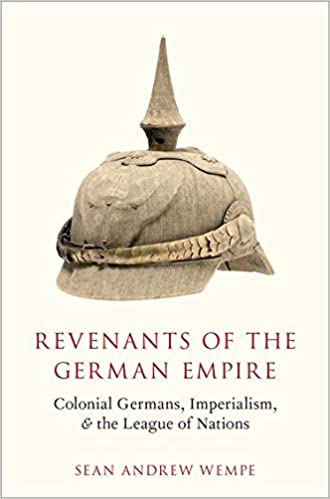
1919年,凡尔赛条约剥夺了德国的海外殖民地。这种向后殖民国家的突然过渡,让男性和女性投资于德国帝国主义,以重建他们在国际舞台上的地位。早期遗留下来的这些科隆奥尔德乌彻(Cololonialdeutsche,殖民地时期)
(德国人)利用一切可能的机会恢复、更新和推销他们对德国和欧洲殖民目的的理解,以便在民族主义和帝国主义的论述中重建自己作为“专家”和“文明伙伴”的地位。
《德意志帝国的复仇者:殖民地德国人、帝国主义和国联》追踪了这一多样化的殖民地德国人群体在适应新环境时遇到的困难,比如他们被遣返回魏玛德国,或者作为新非洲战争胜利者的臣民
授权。面对新的国际法体系,殖民地德国人重新定位了他们对帝国权力和群体身份的概念,以适应一个不是他们自己的殖民帝国的世界。这本书探讨了前殖民官员、定居者和殖民游说团体如何利用
影响外交热点的国际联盟框架,包括1927-1933年西南非洲入籍争议、洛迦诺会议和永久授权委员会。肖恩·温普修改了国际联盟形式的标准历史描述
国际治理、德国加入联盟、利益集团在国际组织和外交中的作用,以及自由帝国主义。在分析德国殖民地对两次大战之间自由国际主义的投资和参与时,该项目挑战了直接对话的理念
德国殖民时期和纳粹时代之间的连续性。
Revenants of the German Empire: Colonial Germans, Imperialism, and the League of Nations
In 1919 the Treaty of Versailles stripped Germany of its overseas colonies. This sudden transition to a post-colonial nation left the men and women invested in German imperialism to rebuild their status on the international stage. Remnants of an earlier era, these Kolonialdeutsche (Colonial
Germans) exploited any opportunities they could to recover, renovate, and market their understandings of German and European colonial aims in order to reestablish themselves as “experts” and “fellow civilizers” in discourses on nationalism and imperialism.
Revenants of the German Empire: Colonial Germans, Imperialism, and the League of Nations tracks the difficulties this diverse group of Colonial Germans encountered while they adjusted to their new circumstances, as repatriates to Weimar Germany or as subjects of the War’s victors in the new African
Mandates. Faced with novel systems of international law, Colonial Germans re-situated their notions of imperial power and group identity to fit in a world of colonial empires that were not their own. The book examines how former colonial officials, settlers, and colonial lobbies made use of the
League of Nations framework to influence diplomatic flashpoints including the Naturalization Controversy in Southwest Africa, the Locarno Conference, and the Permanent Mandates Commission from 1927-1933. Sean Wempe revises standard historical portrayals of the League of Nations’ form of
international governance, German participation in the League, the role of interest groups in international organizations and diplomacy, and liberal imperialism. In analyzing Colonial German investment and participation in interwar liberal internationalism, the project challenges the idea of a direct
continuity between Germany’s colonial period and the Nazi era.
OR




